Gordon S. Wood Quotes & Sayings
Enjoy the top 34 famous quotes, sayings and quotations by Gordon S. Wood.
Famous Quotes By Gordon S. Wood
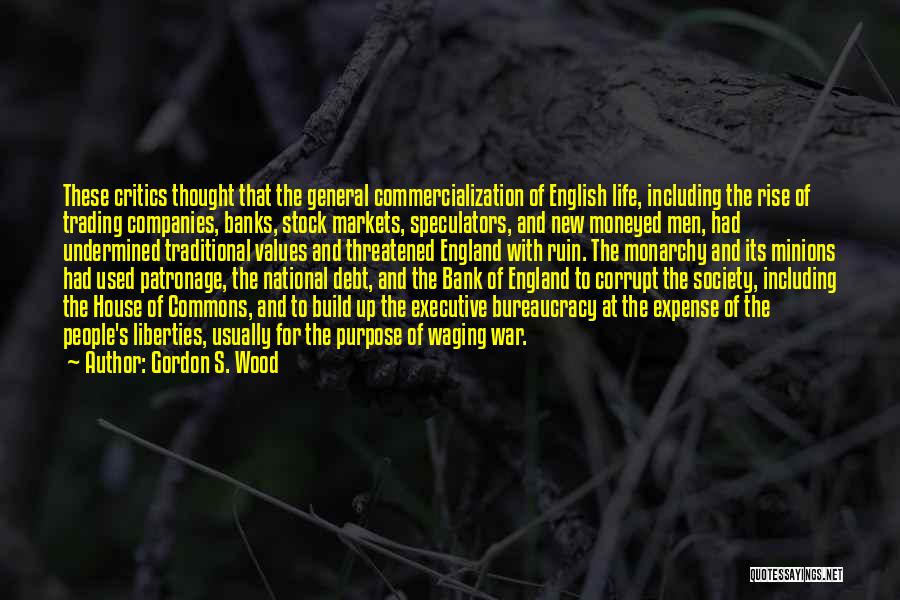
These critics thought that the general commercialization of English life, including the rise of trading companies, banks, stock markets, speculators, and new moneyed men, had undermined traditional values and threatened England with ruin. The monarchy and its minions had used patronage, the national debt, and the Bank of England to corrupt the society, including the House of Commons, and to build up the executive bureaucracy at the expense of the people's liberties, usually for the purpose of waging war. — Gordon S. Wood

Showing oneself eager for office was a sign of being unworthy of it, for the office-seeker probably had selfish views rather than the public good in mind. — Gordon S. Wood
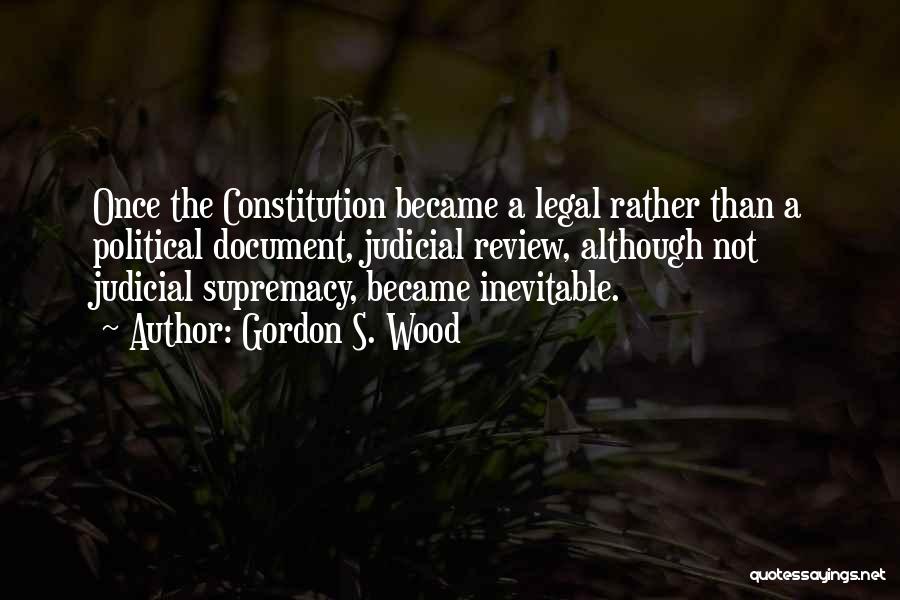
Once the Constitution became a legal rather than a political document, judicial review, although not judicial supremacy, became inevitable. — Gordon S. Wood
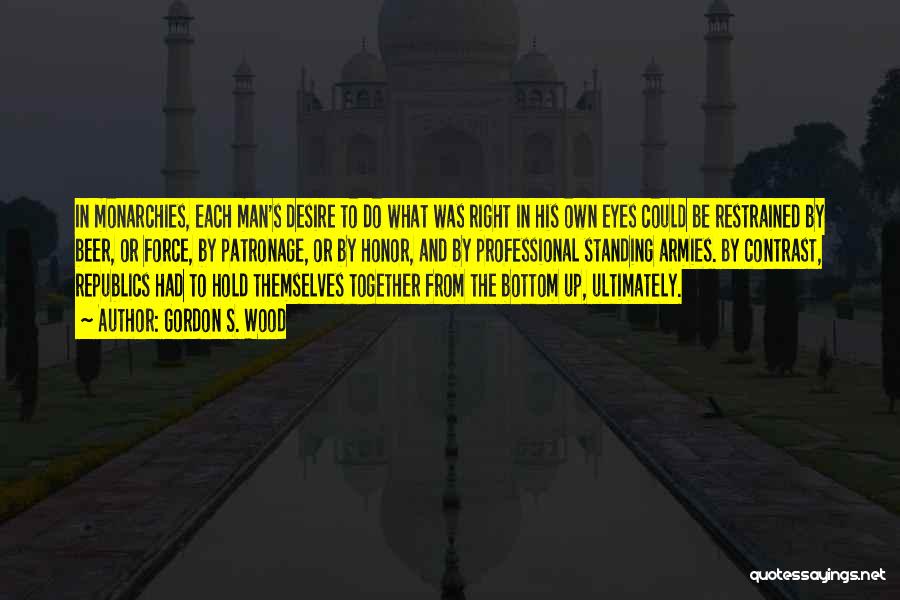
In monarchies, each man's desire to do what was right in his own eyes could be restrained by beer, or force, by patronage, or by honor, and by professional standing armies. By contrast, republics had to hold themselves together from the bottom up, ultimately. — Gordon S. Wood
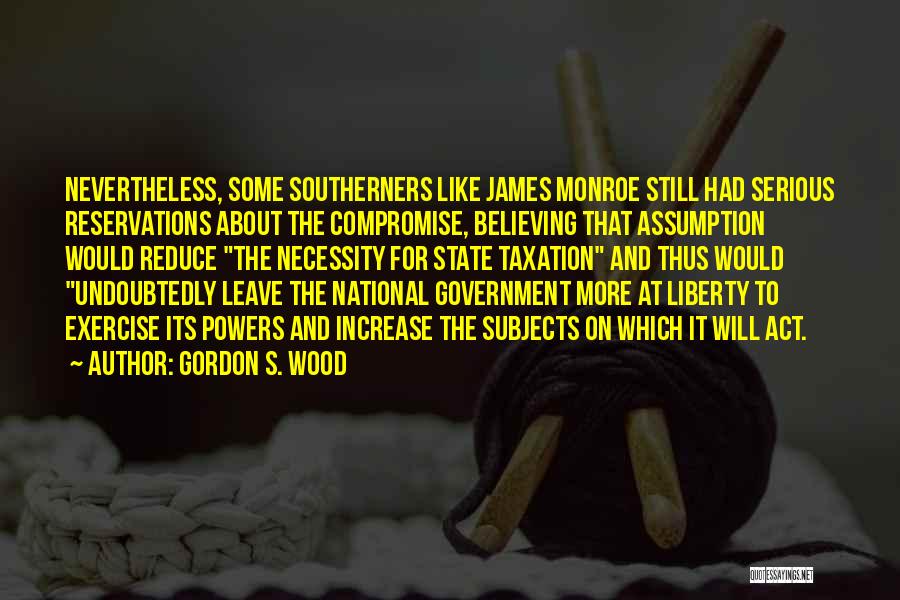
Nevertheless, some Southerners like James Monroe still had serious reservations about the compromise, believing that assumption would reduce "the necessity for State taxation" and thus would "undoubtedly leave the national government more at liberty to exercise its powers and increase the subjects on which it will act. — Gordon S. Wood
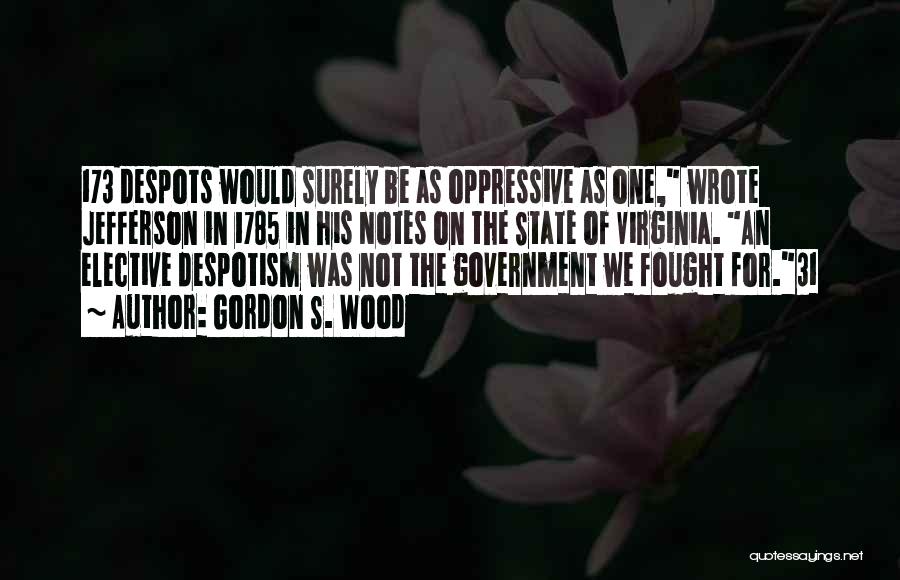
173 despots would surely be as oppressive as one," wrote Jefferson in 1785 in his Notes on the State of Virginia. "An elective despotism was not the government we fought for."31 — Gordon S. Wood

Between 1803 and 1812 Britain and France and their allies seized nearly fifteen hundred American ships, with Britain taking 917 to France's 558. — Gordon S. Wood
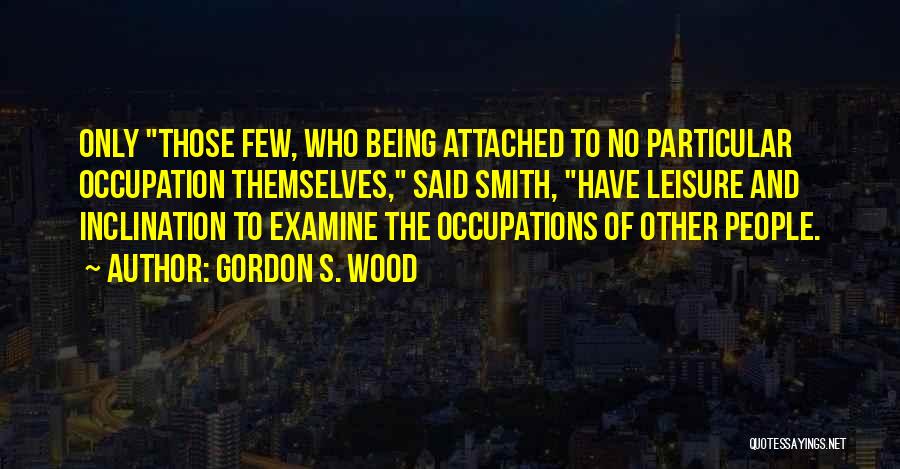
Only "those few, who being attached to no particular occupation themselves," said Smith, "have leisure and inclination to examine the occupations of other people. — Gordon S. Wood
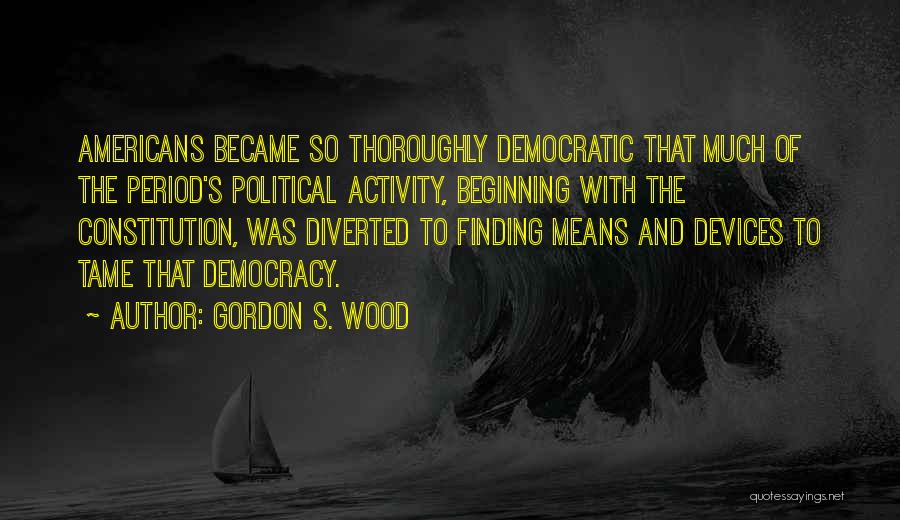
Americans became so thoroughly democratic that much of the period's political activity, beginning with the Constitution, was diverted to finding means and devices to tame that democracy. — Gordon S. Wood
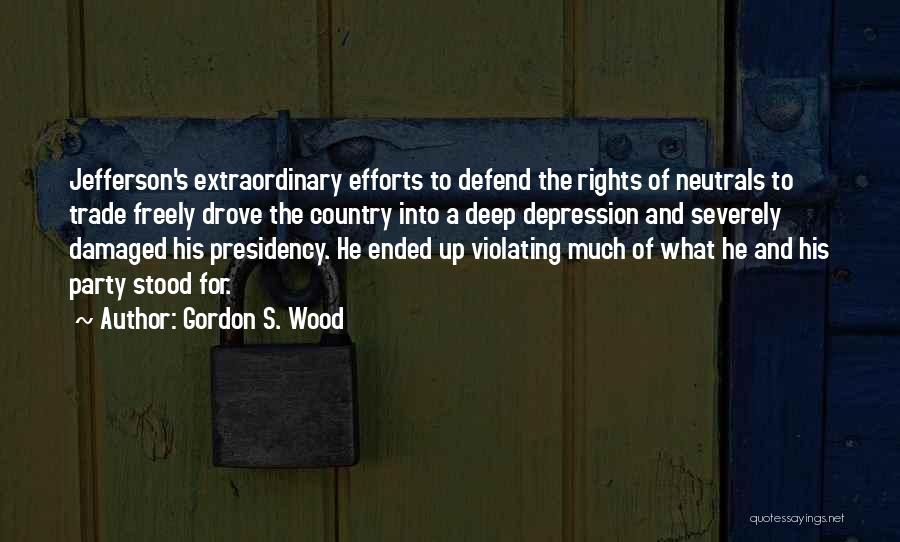
Jefferson's extraordinary efforts to defend the rights of neutrals to trade freely drove the country into a deep depression and severely damaged his presidency. He ended up violating much of what he and his party stood for. — Gordon S. Wood
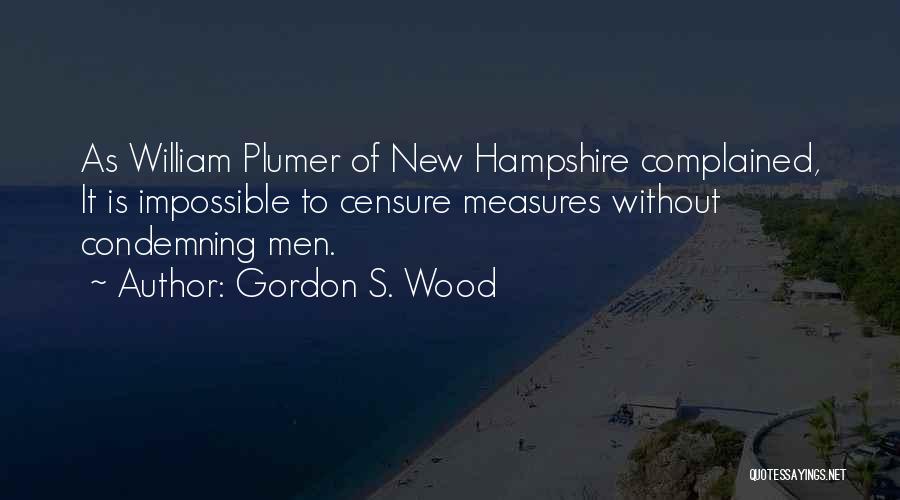
As William Plumer of New Hampshire complained, It is impossible to censure measures without condemning men. — Gordon S. Wood

Wilkinson remained a central figure in the Spanish Conspiracy even after he became a lieutenant colonel and later general and commander of the U.S. Army. Even without knowing that he was a paid agent of Spain, John Randolph of Virginia said that Wilkinson was the only man he ever knew who from the bark to the very core was a villain. — Gordon S. Wood

History is the queen of the humanities. It teaches wisdom and humility, and it tells us how things change through time. — Gordon S. Wood
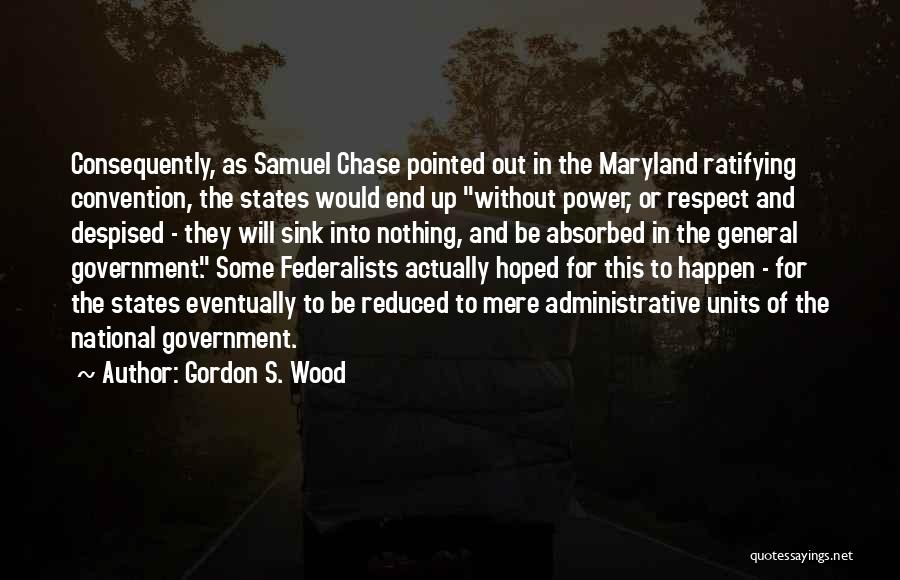
Consequently, as Samuel Chase pointed out in the Maryland ratifying convention, the states would end up "without power, or respect and despised - they will sink into nothing, and be absorbed in the general government." Some Federalists actually hoped for this to happen - for the states eventually to be reduced to mere administrative units of the national government. — Gordon S. Wood

By contrast with this extensive Republican use of the press, the Federalists did little. Presuming that they had a natural right to rule, they had no need to stir up public opinion, which was what demagogues did in exploiting the people's ignorance and innocence.37 Federalist editors and printers of newspapers like John Fenno and his Gazette of the United States did exist, but most of these supporters of the national government were conservative in temperament; they tended to agree with the Federalist gentry that artisan-printers had no business organizing political parties or engaging in electioneering. — Gordon S. Wood

The Civil War was the climax of a tragedy that was preordained from the time of the Revolution. Only with the elimination of slavery could this nation that Jefferson had called "the world's best hope" for democracy even begin to fulfill its great promise. — Gordon S. Wood
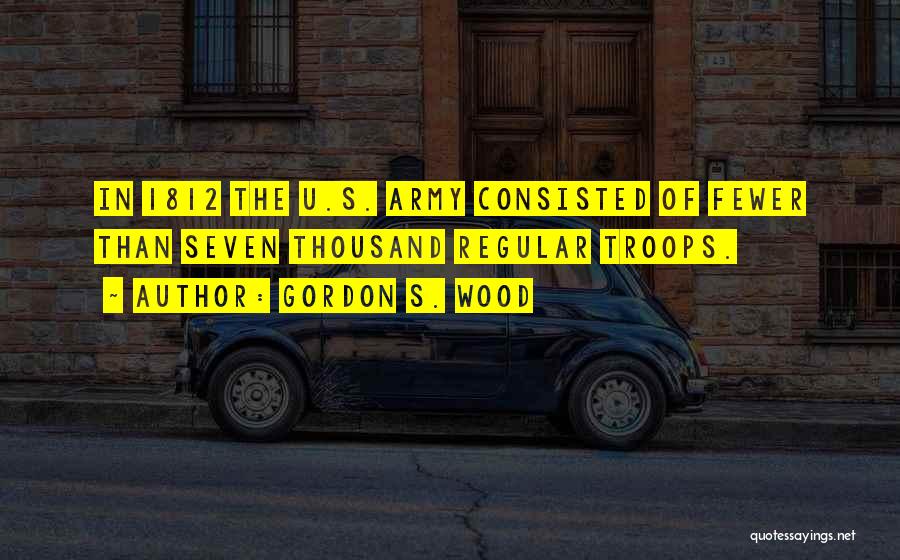
In 1812 the U.S. Army consisted of fewer than seven thousand regular troops. — Gordon S. Wood

These multiplying societies treated the sick, aided the industrious poor, housed orphans, fed imprisoned debtors, built huts for shipwrecked sailors, and, in the case of the Massachusetts Humane Society, even attempted to resuscitate those suffering from "suspended animation," that is, those such as drowning victims who appeared to be dead but actually were not. The fear of being buried alive was a serious concern at this time. Many, like Washington on his deathbed, asked that their bodies not be immediately interred in case they might be suffering from suspended animation. — Gordon S. Wood

Intellectual activity in a culture is not a one-way flow between the great minds and passive recipients; it is a discourse, a complex marketplace-like conglomeration of intellectual exchanges involving many participants all trying to manipulate the ideas available to them in order to explain, justify, lay blame for, or otherwise make sense of what is happening around them. Everyone, not just the great minds, participates in this complicated process. — Gordon S. Wood
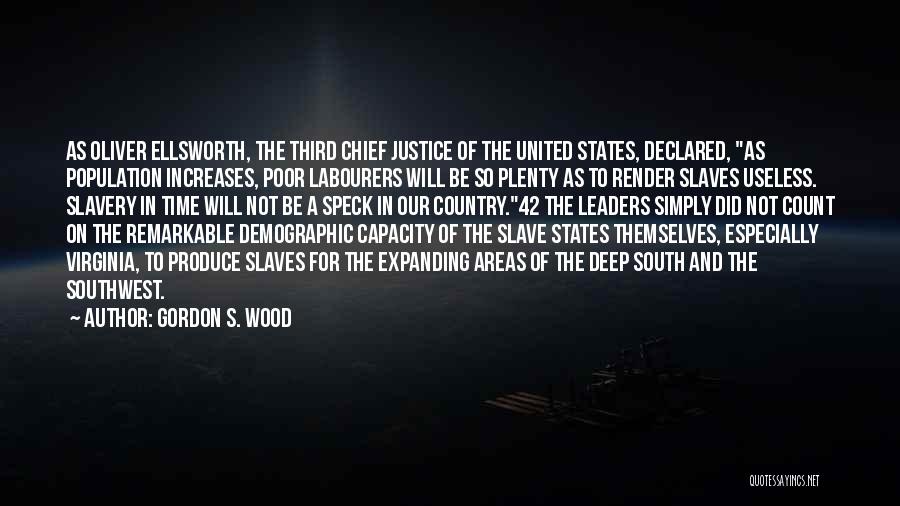
As Oliver Ellsworth, the third chief justice of the United States, declared, "As population increases, poor labourers will be so plenty as to render slaves useless. Slavery in time will not be a speck in our country."42 The leaders simply did not count on the remarkable demographic capacity of the slave states themselves, especially Virginia, to produce slaves for the expanding areas of the Deep South and the Southwest. — Gordon S. Wood
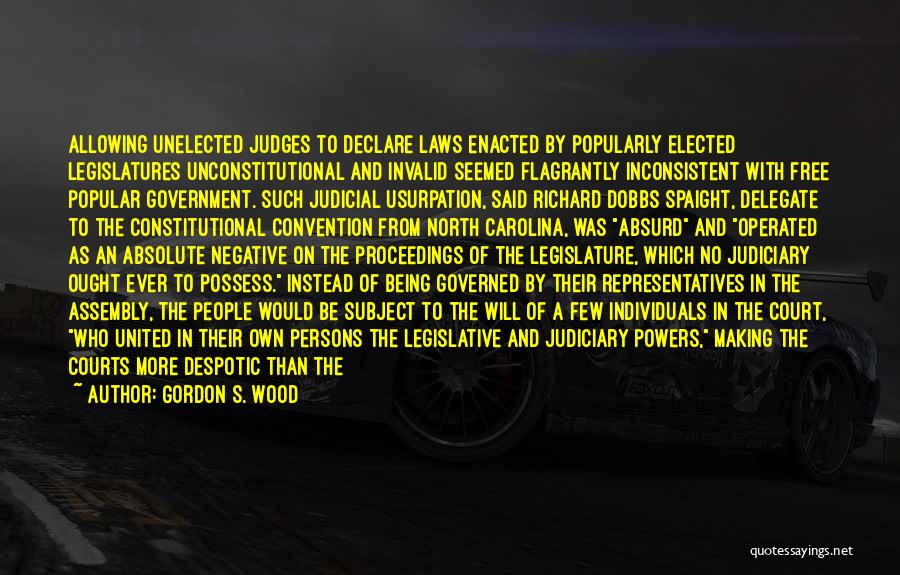
Allowing unelected judges to declare laws enacted by popularly elected legislatures unconstitutional and invalid seemed flagrantly inconsistent with free popular government. Such judicial usurpation, said Richard Dobbs Spaight, delegate to the Constitutional Convention from North Carolina, was "absurd" and "operated as an absolute negative on the proceedings of the Legislature, which no judiciary ought ever to possess." Instead of being governed by their representatives in the assembly, the people would be subject to the will of a few individuals in the court, "who united in their own persons the legislative and judiciary powers," making the courts more despotic than the Roman decemvirate or of any monarchy in Europe. — Gordon S. Wood
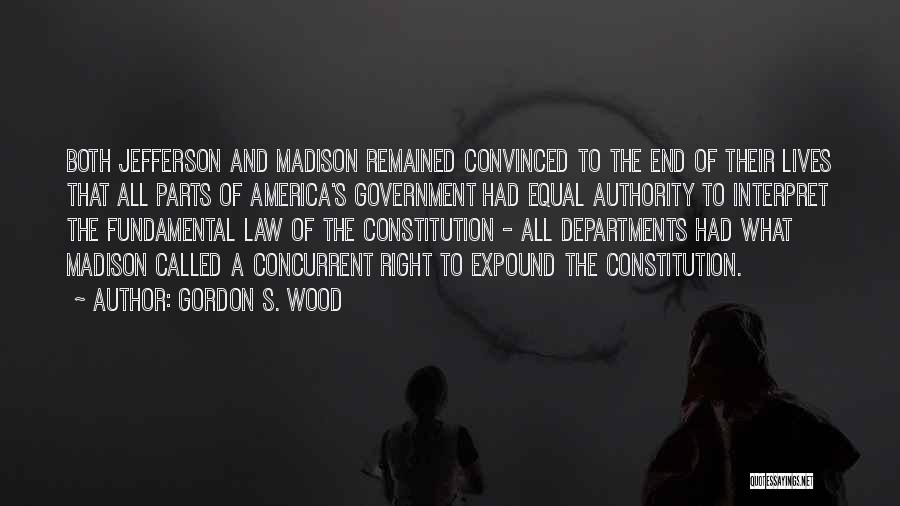
Both Jefferson and Madison remained convinced to the end of their lives that all parts of America's government had equal authority to interpret the fundamental law of the Constitution - all departments had what Madison called a concurrent right to expound the constitution. — Gordon S. Wood

Academics have given up trying to recover an honest picture of the past and have decided that their history-writing should be simply an instrument of moral hand-wringing. — Gordon S. Wood

But what is worse than all," observed the English traveler Isaac Weld, "these wretches in their combat endeavor to their utmost to tear out each other's testicles."31 — Gordon S. Wood
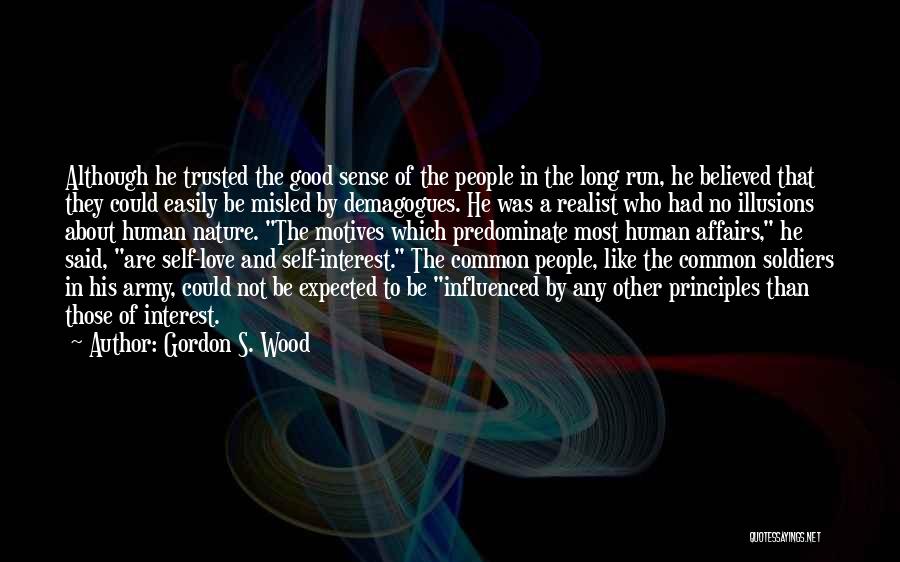
Although he trusted the good sense of the people in the long run, he believed that they could easily be misled by demagogues. He was a realist who had no illusions about human nature. "The motives which predominate most human affairs," he said, "are self-love and self-interest." The common people, like the common soldiers in his army, could not be expected to be "influenced by any other principles than those of interest. — Gordon S. Wood

Virtue became less the harsh and martial self-sacrifice of antiquity and more the modern willingness to get along with others for the sake of peace and prosperity. — Gordon S. Wood

Hamilton used the sinking fund to maintain the confidence of creditors in the government's securities; he had no intention of paying off the outstanding principal of the debt. Retiring the debt would only destroy its usefulness as money and as a means of attaching investors to the federal government. — Gordon S. Wood
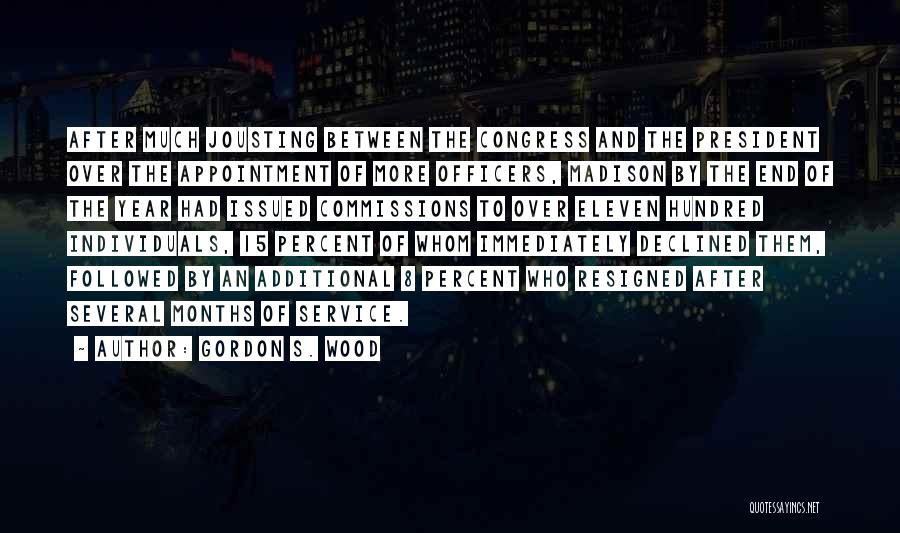
After much jousting between the Congress and the president over the appointment of more officers, Madison by the end of the year had issued commissions to over eleven hundred individuals, 15 percent of whom immediately declined them, followed by an additional 8 percent who resigned after several months of service. — Gordon S. Wood

The idea of labor, of hard work, leading to increased productivity was so novel, so radical, in the overall span of Western history that most ordinary people, most of those who labored, could scarcely believe what was happening to them. Labor had been so long thought to be the natural and inevitable consequence of necessity and poverty that most people still associated it with slavery and servitude. Therefore any possibility of oppression, any threat to the colonists' hard earned prosperity, any hint of reducing them to the povery of other nations, was especially frightening; for it seemed likely to slide them back into the traditional status of servants or slaves, into the older world where labor was merely a painful necessity and not a source of prosperity. — Gordon S. Wood
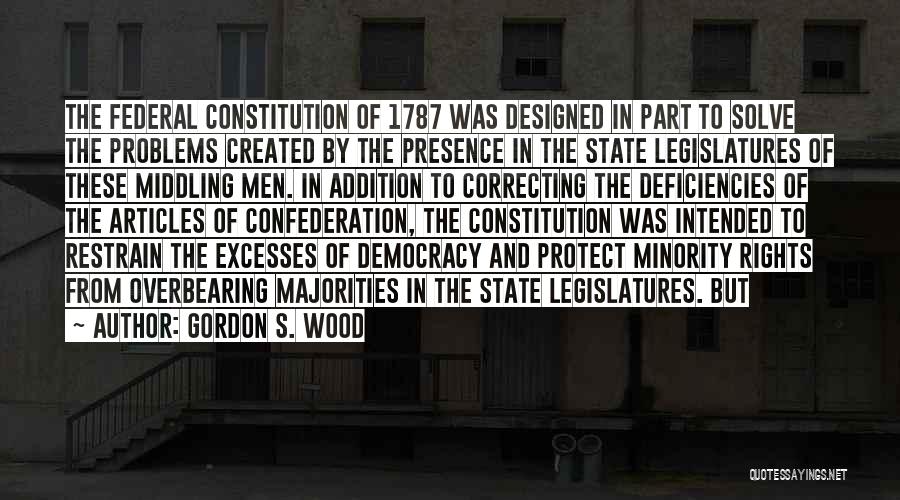
THE FEDERAL CONSTITUTION of 1787 was designed in part to solve the problems created by the presence in the state legislatures of these middling men. In addition to correcting the deficiencies of the Articles of Confederation, the Constitution was intended to restrain the excesses of democracy and protect minority rights from overbearing majorities in the state legislatures. But — Gordon S. Wood
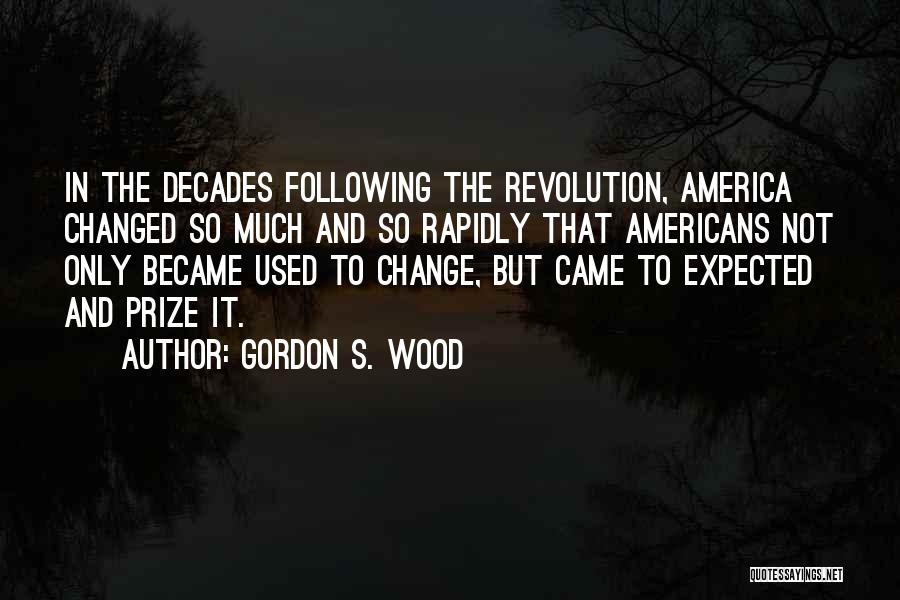
In the decades following the Revolution, America changed so much and so rapidly that Americans not only became used to change, but came to expected and prize it. — Gordon S. Wood

Do not give to persons able to work for a living," declared a critic of the traditional paternalistic charity in 1807. "Do not support widows who refuse to put out their children. Do not let the means of support be made easier to one who does not work than to those who do. — Gordon S. Wood
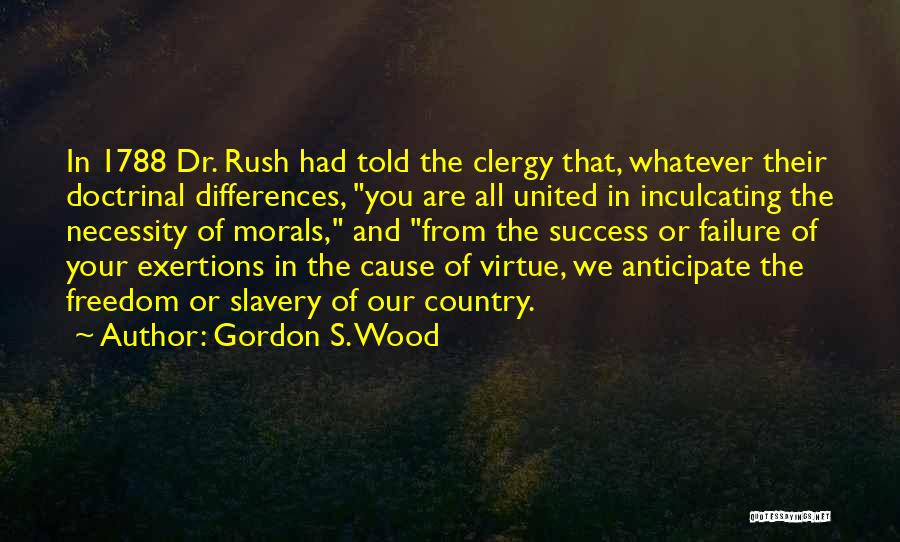
In 1788 Dr. Rush had told the clergy that, whatever their doctrinal differences, "you are all united in inculcating the necessity of morals," and "from the success or failure of your exertions in the cause of virtue, we anticipate the freedom or slavery of our country. — Gordon S. Wood
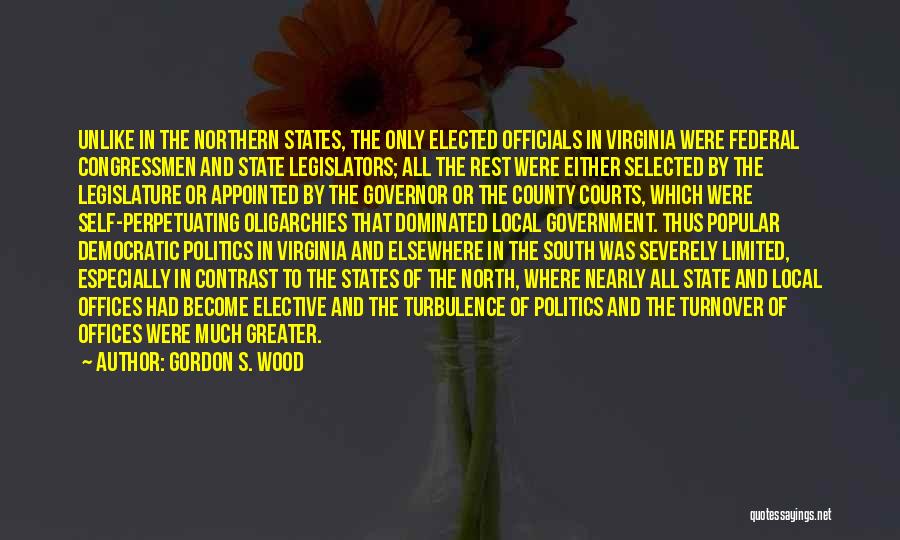
Unlike in the Northern states, the only elected officials in Virginia were federal congressmen and state legislators; all the rest were either selected by the legislature or appointed by the governor or the county courts, which were self-perpetuating oligarchies that dominated local government. Thus popular democratic politics in Virginia and elsewhere in the South was severely limited, especially in contrast to the states of the North, where nearly all state and local offices had become elective and the turbulence of politics and the turnover of offices were much greater. — Gordon S. Wood





